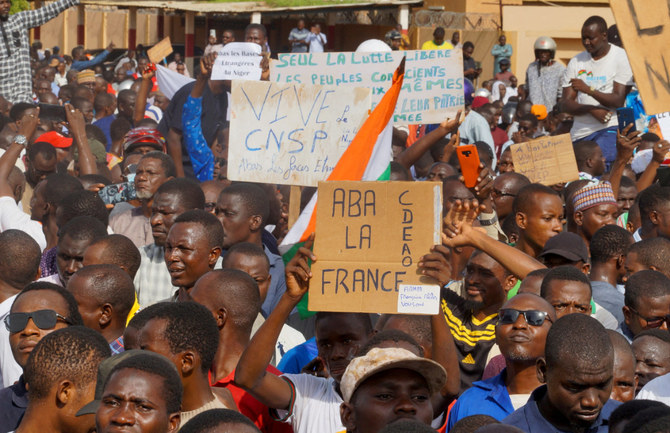ABUJA, Nigeria: African leaders on Sunday gave the junta in Niger one week to cede power or face the possible use of force, and slapped financial sanctions on the putschists, after the latest coup in the jihadist-plagued Sahel region raised alarm on the continent and in the West.
In the third coup in as many years to fell a leader in the Sahel, Niger’s elected president and Western ally, Mohamed Bazoum, has been held by the military since Wednesday.
General Abdourahamane Tiani, the head of the powerful presidential guard, has declared himself leader and said the putsch was a response to “the degradation of the security situation” linked to jihadist bloodshed, as well as corruption and economic woes.
Bazoum is one of a dwindling group of elected presidents and pro-Western leaders in the Sahel, where since 2020 a jihadist insurgency has also triggered coups in Mali and Burkina Faso.
Former colonial ruler France and the European Union have suspended security cooperation and financial aid to Niger following the coup, while the United States warned that its aid could also be at stake.
At an emergency summit in Nigeria, the Economic Community of West African States (ECOWAS) regional bloc demanded Bazoum be reinstated within a week.
Otherwise, the bloc said it would take “all measures” to restore constitutional order.
“Such measures may include the use of force for this effect,” it said in a statement.
“No more time for us to send a warning signal... It’s time for action,” said Bola Tinubu, president of Nigeria and ECOWAS chairman.
Washington welcomed “the strong leadership of the Economic Community of West African States (ECOWAS) Heads of State and Government to defend constitutional order in Niger,” US Secretary of State Antony Blinken said in a statement joining calls for the immediate release of Bazoum and the restoration of the democratically-elected government.
“The United States will remain actively engaged with ECOWAS and West African leaders on next steps to preserve Niger’s hard-earned democracy,” Blinken added.
ALSO READ:
• President of Niger must be immediately released: OIC
• EU, France suspend cooperation and aid to Niger after coup
It was not immediately clear how the 15-member ECOWAS could use force. Last year, the bloc agreed to create a regional security force to intervene against jihadists and prevent military coups, but details on the force and its funding have not been outlined.
The bloc also slapped financial sanctions on the junta leaders and the country, freezing “all commercial and financial transactions” between member states and Niger — one of the world’s poorest nations, often ranking last on the UN’s Human Development Index.
Niger’s Prime Minister Ouhoumoudou Mahamadou told broadcaster France24 Sunday that sanctions were “going to be a disaster” both economically and socially.
Bazoum’s PNDS party called for demonstrations to be held to demand the release of the president.
On Saturday, the junta condemned the ECOWAS summit, saying its aim was to “approve a plan of aggression against Niger, in the form of an imminent military intervention in Niamey.”
The intervention would be “in cooperation with African countries who are not members of the regional body and certain Western nations,” junta member Amadou Abdramane said on national television.
Former Niger president Mahamadou Issoufou, whom Bazoum succeeded as head of state, on Sunday posted on social media that he intended to negotiate with the junta to restore Bazoum to the presidency.
Rooting for Putin
In the capital Niamey, thousands of people waving Russian and Niger flags rallied outside the national parliament in a show of support for the junta.
Moscow has for years strived to increase its influence in Africa, and in Niger’s neighbor Mali — another impoverished former French colony — the military junta has been cooperating with forces from Russia.
The demonstrators later moved on to the French embassy in Niamey, shouting “long live Putin” and “down with France.”
AFP saw some tear down a sign for the embassy and trample on it.
Demonstrators also tried to storm the embassy, but were dispersed with tear gas, an AFP journalist saw.

Nigerien security forces prepare to disperse pro-junta demonstrators gathered outside the French embassy in Niamey, the capital city of Niger, on July 30, 2023. (REUTERS)
France condemned the assault on its embassy, warning it would retaliate if its citizens or interests were attacked and said it had strengthened security at the embassy.
After a wave of condemnation for the coup, punitive measures have already begun in the West.
France — which has 1,500 soldiers in Niger — said on Saturday it was suspending development aid and budgetary support to the West African nation.
European Union diplomatic chief Josep Borrell meanwhile said the EU would not recognize the putschists, and announced the indefinite suspension of security cooperation with Niger with immediate effect, as well as budgetary aid.
The United States — which has about 1,000 troops in Niger — has offered Bazoum Washington’s steadfast support and warned those detaining him that they were “threatening years of successful cooperation and hundreds of millions of dollars of assistance.”
The African Union condemned the coup and expressed deep concern over the “alarming resurgence” of military overthrows in Africa.
Niger has had a turbulent political history since gaining independence in 1960, with four coups as well as numerous other attempts — including two previously against Bazoum.


























